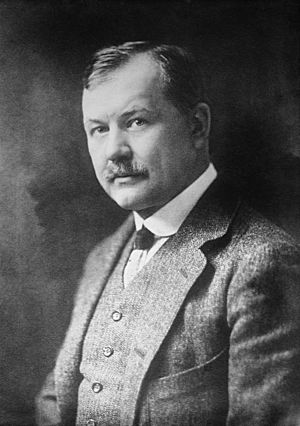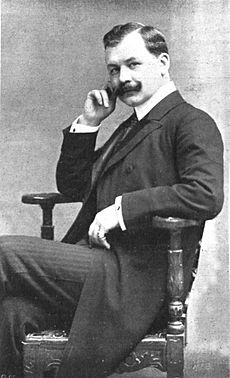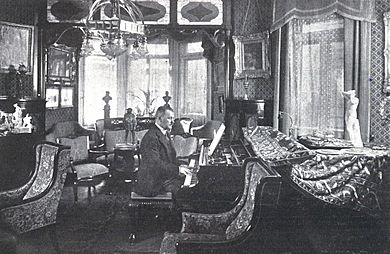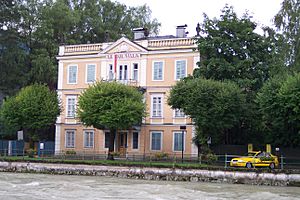Franz Lehár facts for kids
Franz Lehár (born April 30, 1870 – died October 24, 1948) was a famous composer from Austria-Hungary. He is best known for his operettas, which are like light operas with singing and speaking parts. His most popular work is The Merry Widow (Die lustige Witwe).
Contents
Franz Lehár: His Life and Music
Franz Lehár was born in Komárom, Hungary. His father was a bandmaster in the army, and his mother was Hungarian. Franz grew up speaking only Hungarian until he was 12 years old.
Early Life and Musical Training
Franz studied the violin at the Prague Conservatory. His teacher was Antonín Bennewitz. Another famous composer, Antonín Dvořák, told Franz to focus on writing music. However, the school rules did not allow students to study both playing an instrument and composing. So, Franz studied violin, but he taught himself how to compose music. He even took some secret lessons.
After finishing school in 1888, he joined his father's band in Vienna. He became an assistant bandmaster. Two years later, he became the youngest bandmaster in the Austro-Hungarian Army. He then left the army to join the navy.
With the navy, Lehár was a music director in Pola from 1894 to 1896. He left when his first opera, Kukuschka, was performed. It was not a huge success. So, Lehár rejoined the army. He served in different cities like Trieste, Budapest, and Vienna.
In 1902, he became a conductor at the famous Vienna Theater an der Wien. His operetta Wiener Frauen was performed there.
Lehár is most famous for his operettas. The most successful one is The Merry Widow. But he also wrote other types of music, like sonatas and marches. He composed many waltzes too. Some of his songs became very popular, such as "Vilja" from The Merry Widow. Another famous song is "You Are My Heart's Delight" from The Land of Smiles.
Lehár often worked with the famous singer Richard Tauber. Tauber sang in many of Lehár's operettas. Between 1925 and 1934, Lehár wrote six operettas especially for Tauber's voice. In 1935, Lehár started his own music publishing company. This helped him control the rights to his music.
Lehár and Difficult Times
Lehár's connection with the Nazi government was complicated. He often worked with Jewish writers for his operas. His wife, Sophie, was also Jewish before she converted to Catholicism. This caused problems for them.
Even though Hitler liked Lehár's music, there was still some hostility. However, a high-ranking official named Joseph Goebbels helped Lehár. In 1938, Lehár's wife was given a special status that protected her. Still, there were attempts to have her sent away.
The Nazis used Lehár's music for their own purposes. Concerts of his music were held in Paris in 1941. Lehár tried to help his friends who were in danger. He tried to protect one of his writers, Fritz Löhner-Beda, but sadly, Beda was killed. He also tried to help Louis Treumann, who was the first actor to play Danilo in The Merry Widow. Treumann and his wife were sent to a concentration camp, where they both died.
Lehár received awards from Hitler in 1939 and 1940. He even gave Hitler a special book in 1938 to celebrate the 50th performance of The Merry Widow.
Later Years and Legacy
Franz Lehár passed away in 1948 at the age of 78. He was buried in Bad Ischl, near Salzburg. His younger brother, Anton, managed his estate and helped keep Franz Lehár's music popular.
Honours and Recognition
Franz Lehár received many honours during his life and after his death:
- He was made an honorary citizen of Sopron in 1940.
- In 1940, Hitler gave him the Goethe Medal.
- There are streets named after him in Vienna, the Netherlands, Sarajevo, Pula, and Prague.
- An asteroid, 85317 Lehár, was named in his memory in 1995.
Stage Works
Lehár's Music Recordings
Franz Lehár himself conducted recordings of his music.
- In 1908, he conducted twelve songs from his operetta Der Mann mit den drei Frauen.
- In 1929 and 1934, he conducted recordings of The Land of Smiles and Giuditta. These recordings featured famous singers like Richard Tauber.
- Recordings from radio broadcasts in 1942, where Lehár conducted Paganini and Zigeunerliebe, still exist today.
- In 1947, Lehár conducted the Tonhalle Orchestra Zürich for recordings of his operetta overtures and waltzes. These recordings had excellent sound quality for their time.
- After the Berlin Wall fell, recordings of a 1939 concert conducted by Lehár were found. These were later released on CDs.
Fun Stories About Lehár
The famous composer Gustav Mahler and his wife, Alma, once went to see Lehár's The Merry Widow. They loved it so much that they danced to the music when they got home! They tried to play the waltz on the piano from memory but couldn't remember one part.
The next day, they went to a music shop. They felt a bit shy asking for the music for a "popular" operetta. While Mahler kept the staff busy, Alma quickly looked through the music score for The Merry Widow. As soon as they left the shop, Alma sang the whole waltz to Mahler!
See also
 In Spanish: Franz Lehár para niños
In Spanish: Franz Lehár para niños
 | Bessie Coleman |
 | Spann Watson |
 | Jill E. Brown |
 | Sherman W. White |






